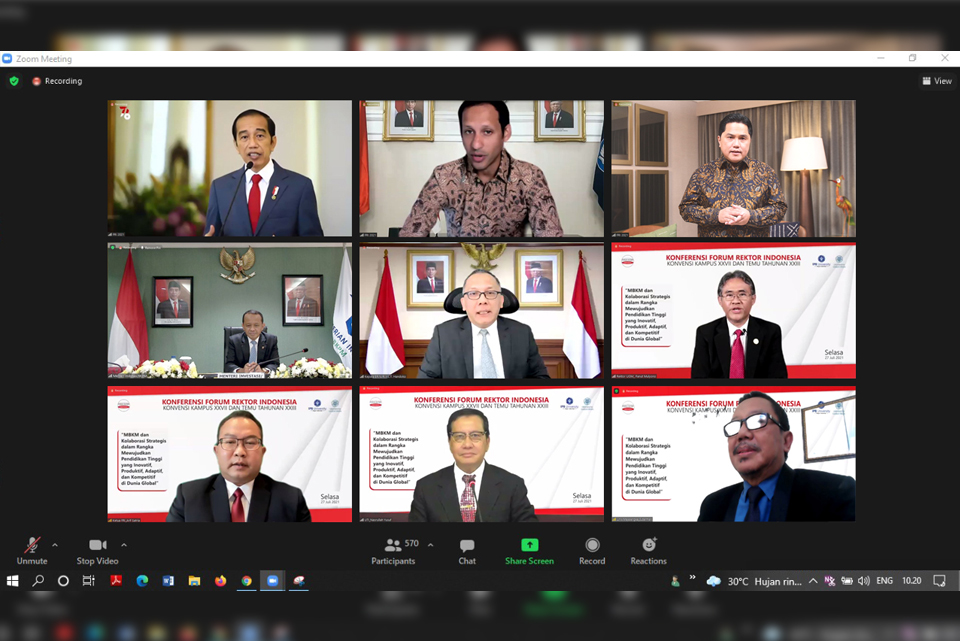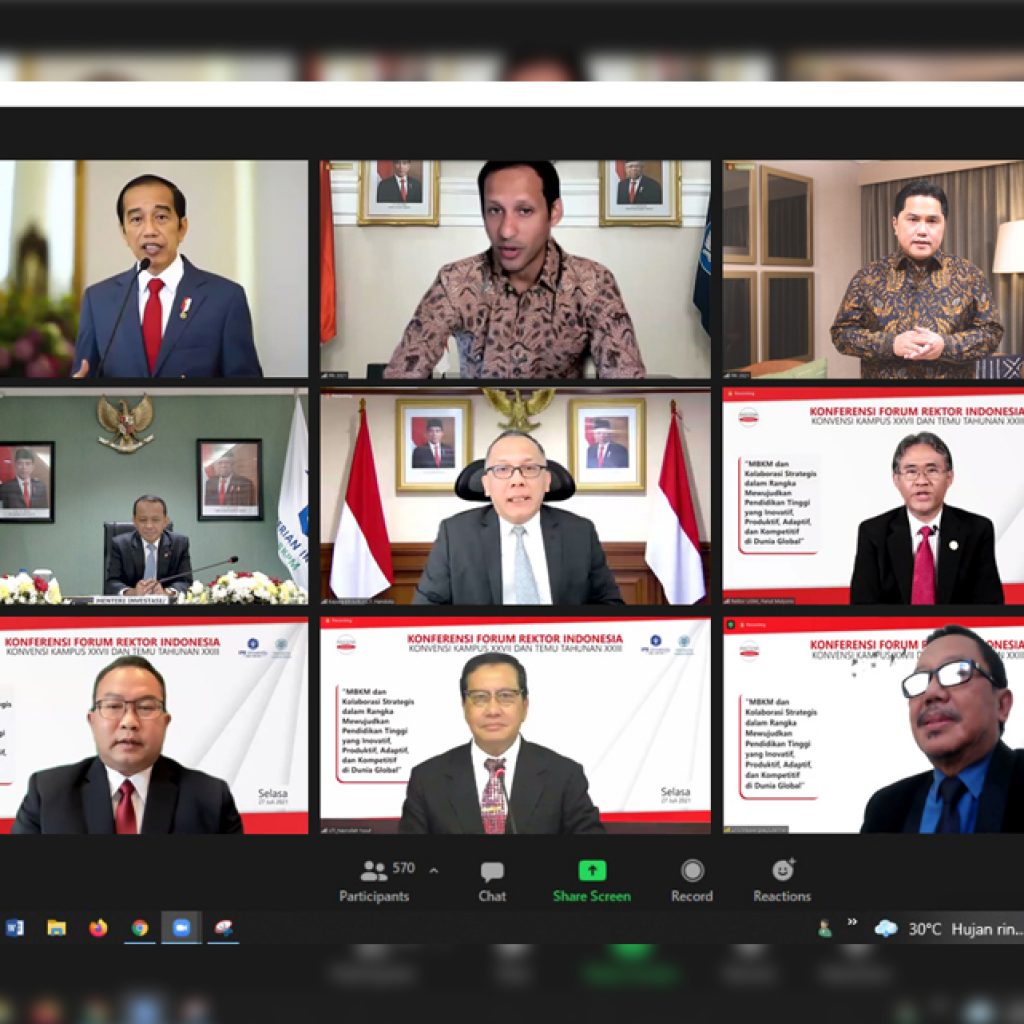
Teknokrat.ac.id, Jakarta,– The Indonesian Chancellors Forum (FRI) for the 2020/2021 period has held a conference; 27th Campus Convention and 23rd Annual Meeting, which was opened by President Joko Widodo virtually, Tuesday (27/7/2021). The conference was continued with a discussion by presenting a number of ministers guided by the moderator of the Chancellor of the Indonesian Technocratic University, Dr. HM. Nasrullah Yusuf, SE, MBA.
The ministers who appeared in the FRI discussion were; Minister of Investment/Head of the Indonesian Investment Coordinating Board (BKPM) Bahlil Lahadalia, SE, M.Sc. Head of the National Research and Innovation Agency of the Republic of Indonesia, Dr. Laksana Tri Handoko, MSc, Minister of State-Owned Enterprises of the Republic of Indonesia Erick Thohir, BA, MBA, Minister of Education, Culture, Research and Technology of the Republic of Indonesia Nadiem Anwar Makarim, BA, MBA. Then the Chancellor of Gadjah Mada University Prof. Ir. Panut Mulyono, M.Eng.
In the discussion which was attended by the Chancellors of State and private Universities, the Head of LLDikti, Nana Yuliana PhD (Indonesian Ambassador to Cuba and Concurrently the Bahamas, Dominican Republic, Haiti, and Jamaica). The following are the Conclusions and Recommendations of the 2021 FRI Conference in the Discussion led by Dr. HM. Nasrullah Yusuf, SE, MBA;
1. The Indonesian Chancellor Forum realizes and shows concern for the national and global situation related to the Covid-19 pandemic and encourages the government to handle the Covid-19 outbreak by all means by optimally involving the academic world. FRI is willing to be a part of this effort.
2. The direction and hope of President Joko Widodo is very clear that universities must be able to adapt quickly so that they can contribute maximally in solving real problems in society.
3. In relation to the Merdeka Learning Campus Merdeka (MBKM) program, FRI views that there are five important things, namely;
a. The need for greater campus autonomy and this is in line with the president’s directive that independence must start from imagination and courage to do new things out of the ordinary;
b. The need for comprehensive regulation and deregulation in the education sector. This also needs to be done for other fields related to the economy and investment such as the hopes and efforts of the Minister of Investment and the Head of BKPM Bahlil Lahdalia, SE., M.Sc.
c. Character and cultural education is the key in the world of higher education so that it is synergistic with the national movement for mental revolution. FRI invites all components of the nation to uphold the noble values of Pancasila;
d. There needs to be a strong and systematic push for cooperation in the world of education and industry through impact research and downstream execution;
e. The need for allocation of financial resources to finance education, especially in the form of scholarships for doctoral degrees in the country.
4. FRI encourages the government to organize a comprehensive research institution so that Indonesian research can have an impact and be global. This is important for achieving independence in various areas of life.
5. The Minister of Investment and BKPM Bahlil emphasized that the pandemic is not over and its impact is extraordinary for all areas of life. Job creation is a very important thing. This requires an entrepreneurial spirit and mentality. Most importantly, we need entrepreneurs who are designed systematically or by design so that universities must adapt to provide education that is relevant to the business world, industry and the real world of work.
6. One thing that is encouraging, the amount of investment outside Java is now higher than Java. This indicates that the even distribution of development has occurred with the government’s efforts in creating new centers of economic growth. This investment and equitable development needs to be balanced with investment in human resources and actively involve universities so that the investment that grows is a quality investment and is based on knowledge-based investment.
7. The National Research and Innovation Agency (BRIN) is expected to be a pioneer in the management of national research so that it is directed, integrated and has a real impact. Indeed, there are no shortcuts in research and innovation, but there is a fast way and that is the task of BRIN with the support of universities. All of this is necessary in order to form a science-based policy.
8. BRIN as a collaborative relationship and multi-stakeholder enabler in order to realize the implementation of national talent management in the field of research and innovation. BRIN is encouraged to open the widest possible collaboration opportunities in research and innovation activities through endowment funds for universities and research institutions.
9. The Ministry of Education, Culture, Research and Technology encourages universities to have the capacity to adapt to change, have a more direct impact on society, and meet higher education standards at the global level. The MBKM program is a revolutionary movement to encourage students to get the opportunity and their right to study outside the study program and outside the campus and can choose one of the 8 available MBKM programs. On the other hand, FRI also considers the need for regulation and deregulation of regulations that can support MBKM.
10. The Ministry of BUMN encourages collaboration between Industry within the Ministry of BUMN and Universities to accelerate innovation and provide solutions to the nation’s problems, namely in strategic fields in the fields of food security, energy security, health security and technological sovereignty.
11. UGM Chancellor Prof. Panut Mulyono reminded that innovation should not stop at the upstream level, but should be pushed to the industrial level. Learning for students in the future must be relevant to the type of work that will change in the future. Students must be equipped with the appropriate competencies so that they can compete, universities must be able to prepare an innovative learning ecosystem (MBKM).
12. The disparity of higher education institutions in Indonesia is very high. Therefore, it is hoped that the Indonesian Chancellor’s Forum can facilitate the need for assistance for FRI member universities (especially small universities). In addition, FRI is expected to be able to bridge member universities with the industrial world.
